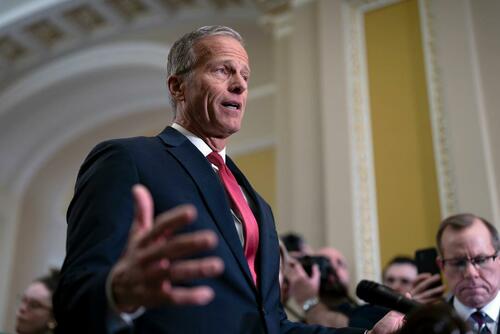Senate Republicans Revise Trump Tax Bill To Win Over Holdouts, Eye July 4 Passage
Senate Republicans unveiled a revised version of President Trump’s $4.2 trillion tax package early Saturday morning, making targeted concessions on state tax deductions, Medicaid policy, and renewable energy provisions in an effort to unite their caucus ahead of a July 4 deadline set by the White House.
 Senate Majority Leader John Thune (AP)
Senate Majority Leader John Thune (AP)The updated draft reflects compromises among Senate GOP factions that have sparred for weeks over how aggressively to cut social safety net programs and whether to roll back clean energy incentives enacted under the Biden administration. The legislation, if passed, would serve as the centerpiece of Mr. Trump’s second-term economic agenda.
Senate Majority Leader John Thune announced that voting on the bill would begin Saturday afternoon, with a final vote potentially coming as soon as Sunday. If it does pass the Senate, Republican leaders have indicated they will call House members back to Washington early next week in hopes of sending the legislation to the president’s desk before Independence Day.
However, it remains uncertain whether all 50 Republican senators are prepared to back the measure. Senator Ron Johnson of Wisconsin said Saturday on Fox News that he would oppose beginning debate on the bill immediately, citing the need for more time. “This is an important bill,” Johnson said. “There’s no need to rush it.”
A Revised SALT Cap
To address concerns from House Republicans representing high-tax states, the new draft raises the cap on the state and local tax (SALT) deduction from $10,000 to $40,000 for five years. The cap would snap back to its original level thereafter, with a modest 1% annual increase during the interim period. The deduction would begin phasing out for taxpayers earning more than $500,000 annually.
A House provision aimed at curbing SALT workarounds used by pass-through businesses was stripped from the text. While fiscal conservatives have criticized the SALT compromise as overly generous, the deal is expected to secure the support of swing-district Republicans and has been endorsed by the White House.
Senate Republicans also removed a controversial Section 899 “revenge tax” on foreign companies and investors following concerns from Wall Street and a request from Treasury Secretary Scott Bessent.
Tax Relief and Medicaid Tweaks
The legislation makes permanent the individual and corporate tax cuts first enacted in 2017 and introduces new temporary breaks for tipped workers, seniors, and car buyers. In a nod to moderate Republicans, the revised bill creates a $25 billion rural hospital fund intended to mitigate the effects of Medicaid spending reductions that critics warn could threaten services in underserved areas.
Senator Susan Collins of Maine had pressed for a $100 billion allocation but has not yet commented on whether the smaller fund will earn her support.
The new version delays the full impact of a 3.5% cap on state Medicaid provider taxes from 2031 to 2032. The cap, which would begin phasing in by 2028, applies only to states that expanded Medicaid under the Affordable Care Act. Additionally, the bill imposes new work requirements for Medicaid recipients and would require ACA-expansion beneficiaries to contribute to their care through co-pays or deductibles.
Renewable Energy Rollbacks and New Land Sales
Republicans accelerated the phaseout of tax credits for wind and solar energy projects, now requiring such projects to be fully operational by the end of 2027 to qualify. That change, reportedly supported by Mr. Trump, could impact companies like NextEra Energy, the nation’s largest renewable developer.
Senate Democratic Leader Chuck Schumer criticized the change, warning on social media that the rollback would “jack up your electric bills and jeopardize hundreds of thousands of jobs.”
The bill also ends the $7,500 electric vehicle tax credit sooner than earlier versions proposed, cutting it off after September 30, 2025, including for used and commercial EVs.
A separate provision reinstated in the draft would authorize the sale of up to 1.2 million acres of federal land across 11 western states for housing and community development, a measure pushed by Senator Mike Lee of Utah. The plan could raise up to $6 billion but faces resistance from GOP senators in affected states.
Tax credits for hydrogen production, originally slated to end this year, would now continue through 2028 for projects started by then.
Broader Cuts and Debt Ceiling Increase
The legislation includes steep cuts to funding for the Consumer Financial Protection Bureau and federal food assistance programs, while increasing allocations for the U.S.-Mexico border wall. It preserves $15 million in funding for a task force to study alternatives to the IRS Direct File program, though it drops language that would have terminated the free filing service entirely — a defeat for tax software providers like Intuit.
A proposed tax on money transfers by non-citizens was scaled back from 3.5% to 1%, a win for companies like Western Union and MoneyGram.
Finally, the bill would raise the debt ceiling by $5 trillion, a move intended to avert a potential federal default projected for as early as August.
With internal GOP divisions still simmering, the path to final passage remains uncertain. Yet with Independence Day looming, Senate Republicans are betting that the new concessions will be enough to unify their ranks — and deliver a long-sought legislative victory for the president.
Tyler Durden
Sat, 06/28/2025 – 13:25


















